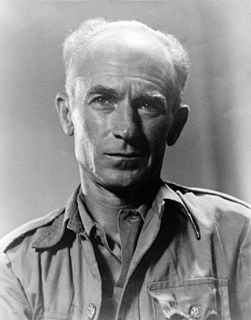A Quote by Vincent Van Gogh
When we are working at a difficult task and strive after a good thing, we are fighting a righteous battle, the direct reward of which is that we are kept from much evil.
Related Quotes
When we are working at a difficult task and strive after a good thing, we are fighting a righteous battle, the direct reward of which is that we are kept from much evil. As we advance in life it becomes more and more difficult, but in fighting the difficulties the inmost strength of the heart is developed.
When anything is in the presence of evil, but is not as yet evil, the presence of good arouses the desire of good in that thing; but the presence of evil, which makes a thing evil, takes away the desire and friendship of the good; for that which was once both good and evil has now become evil only, and the good has no friendship with evil.
Evil is easily discovered; there is an infinite variety; good is almost unique. But some kinds of evil are almost as difficult to discover as that which we call good; and often particular evil of this class passes for good. It needs even a certain greatness of soul to attain to this, as to that which is good.
In this world, there is no absolute good, no absolute evil," the man said. "Good and evil are not fixed, stable entities, but are continually trading places. A good may be transformed into an evil in the next second. And vice versa. Such was the way of the world that Dostoevsky depicted in The Brothers Karamazov. The most important thing is to maintain the balance between the constantly moving good and evil. If you lean too much in either direction, it becomes difficult to maintain actual morals. Indeed, balance itself is the good.
He that doth righteousness; that is, righteousness which the gospel calleth so, is righteous; that is, precedent to, or before he doth that righteousness. For he doth not say, he shall make his person righteous by acts of righteousness that he shall do; for then an evil tree may bear good fruit, yea, and make itself good by doing so; but he saith, He that doth righteousness is righteous; as he saith, He that doth righteousness is born of him.
We must strive for freedom if we strive for self-knowledge. The task of self-knowledge and of further self-development is of such importance and seriousness, it demands such intensity of effort, that to attempt it any old way and amongst other things is impossible. The person who undertakes this task must put it first in his life, which is not so long that he can afford to squander it on trifles.
When one has once accepted and absorbed Evil, it no longer demands the unfitness of the means. The ulterior motives with which youabsorb and assimilate Evil are not your own but those of Evil.... Evil is whatever distracts. Evil knows of the Good, but Good does not know of Evil. Knowledge of oneself is something only Evil has. One means that Evil has is the dialogue.... One cannot pay Evil in installments--and one always keeps on trying to.







































